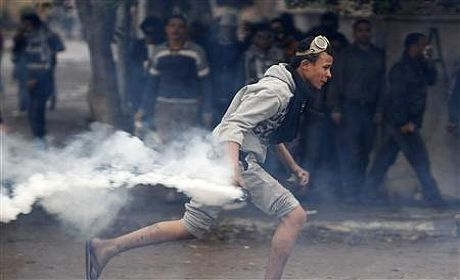Violence or Dialogue

The expansion of political tensions following the announcement of the verdict of Egypt's High Court for the culprits of Port Said Club has led to serious confrontations between the supporters and opponents of this country's Islamist president and the shadow of Egypt's domestic crisis has threatened its security.
After two years since the downfall of Mubarak's totalitarian regime, Egypt is still faced with serious difficulties to achieve calm and peace and the establishment of a democratic government. The circle of sustainable violence among Morsi's opponents within the framework of a non-Islamic movement and the government's inability to respond to people's demands particularly in the economic field has caused even some of the former supporters of the Muslim Brotherhood to accuse Morsi of having contradictions in his behavior and words and there are reports of the appearance of a new dialogue in the Islamist front under the title of the Liberal Muslim Brotherhood.
The indecisiveness of the Morsi government and having no plan to save Egypt's ailing economy have created certain conditions where even the masses of the poor prefer the previous situation and the ruling of an iron fist to gradual reforms and the democratic process of the Muslim Brotherhood. The continuation of Egypt's political life depends on the 4 billion dollar loan of the International Monetary Fund and annual aids of the US and some rich Persian Gulf countries.
The National Salvation Front, led by Mohamed ElBaradei, Amr Moussa, and Hamdeen Sabahi, has called Morsi the elected president of the Muslim Brotherhood and not all political groups of Egypt and stated that the reason behind the prolongation of domestic crisis is the authoritarian policies of the new government and it insists upon the formation of a national unity government and the fair participation of all political groups.
The political power structure of the country, despite some positive steps taken by the government and holding parliamentary and presidential elections and efforts made to reduce the traditional power of the military in various fields, has not fundamentally been changed. Basically, some believe that the Muslim Brotherhood were not involved in the 2011 civil uprising and when the weakness of the past regime was revealed and it was overthrown, it rode on the wave and became a major component in Egypt's developments. On the issue of preparing the constitution and its referendum, the two traditionalist and reformist ideologies were confronted with each other. In the traditionalist front, besides the moderate Muslim Brotherhood, there were the radical Salafis who insist that the principles of the Sharia must be implemented in the society and any delay in its implementation is not acceptable. The violent interpretation of Islam and the theorization of violence in society is one of the major components of the tensions.
This is while the Muslim Brotherhood follows a moderate Islam and is compatible with democracy. Then, how can they compromise with the Salafis to remain in power and dominate their political liberal and nationalist rivals?
Under the present conditions, Morsi attempts to establish a meaningful balance between different political Islamic and non-Islamic movements. During the recent unrests, Morsi has kept this determining element in the power equations next to himself by rendering certain political and economic concessions to the military institution.
The army also tries to play its role desirably under these critical conditions. Therefore, it pursues widespread suppression and implementation of the verdicts of the culprits of recent events. Thus, the army has distanced itself from the reactionist approach and the conservative view of the country’s domestic issues. This measure might, in the short-term, prevent the expansion of more insecurity. Of course, growing crisis in the society due to the continuation of disputes between political movements and the poverty of the people can practically prepare the grounds for civil war in Egypt.
If domestic stability does not return to Egypt, the tourism industry, as one of the main sources of income for the country, will be damaged and foreign investors will not be willing to participate in economic projects, thus, widespread revolution in the form of labor force riots might happen. It seems that Morsi has also felt that the new Egypt has entered its dangerous historical loop. Therefore, besides using an iron fist in dealing with the recent unrests, he has stressed the necessity to talk with the leaders of the opposition. But his opponents reiterate their previous demands including the necessity of Egypt's judicial independence and the changing of some articles of the constitution, especially the emphasis of Articles 2 and 6 on implementation of the principle of the Islamic Sharia in society. Under these circumstances, reaching an agreement between the two sides seems impossible. The creation of divisions in the Islamist front and the decrease of the Muslim Brotherhood’s votes in the run-off presidential election and also in the constitutional referendum have reduced the possibility of this group's success.
Therefore, Morsi and his Muslim Brotherhood supporters must decide on the direction and the pattern upon which they intend to run Egypt. If they intend to run the country based on democratic values and laws, then Morsi should distance himself from the radical Salafis and accept that his government should represent all political groups of Egypt and is not only inclusive of the Muslim Brotherhood and the Salafis. But if he intends to ignore his opponents and impose his own ideas, the economic, social, and political problems of the country will not be solved. Thus, Morsi must calm the atmosphere with prudence and refrain from any type of radicalism in his dealing with the opposition so that domestic conditions will once again be provided for the participation of different political groups in parliamentary elections.

